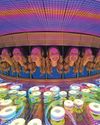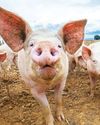
The internet is a global collection of computers that send messages to one another. In the early 1960s, computers were used only for special purposes, such as scientific research. There weren’t a lot of them because they were large and expensive. One computer and its accessories could easily fill an entire room. To exchange data, people would have to plan time to work together, and one computer would connect to another with a telephone call.
Building a network
The US government wanted a network that would allow computers to communicate even if some telephone lines were cut off. Suppose you wanted to send a message from Computer A to Computer B in each of three different types of networks. The first is a network with one central computer with all the others connected to it like the spokes of a wheel. The second is a network of several of these hub-and-spoke networks with their hubs connected. The third is a network where every computer is connected to several others, forming a kind of mesh. Which do you think would be most reliable if some computers and links were damaged?
Diese Geschichte stammt aus der Issue 61-Ausgabe von The Week Junior Science+Nature UK.
Starten Sie Ihre 7-tägige kostenlose Testversion von Magzter GOLD, um auf Tausende kuratierte Premium-Storys sowie über 8.000 Zeitschriften und Zeitungen zuzugreifen.
Bereits Abonnent ? Anmelden
Diese Geschichte stammt aus der Issue 61-Ausgabe von The Week Junior Science+Nature UK.
Starten Sie Ihre 7-tägige kostenlose Testversion von Magzter GOLD, um auf Tausende kuratierte Premium-Storys sowie über 8.000 Zeitschriften und Zeitungen zuzugreifen.
Bereits Abonnent? Anmelden

Camera Obscura
Imagine stepping inside a dark room, where the only source of light comes through one small hole in the wall.

MANCHESTER SCIENCE FESTIVAL
From 18-27 October, shoppers at the Arndale shopping centre in Manchester, England, will face a giant spider.

Should musicians stop touring?
Multiple concerts travelling around the world have a big impact on the environment.

Are ghosts real?
Plenty of people believe in ghosts, but it's hard to find proof.

SMASH STEREOTYPES
In an extract from his prize-winning book, scientist and writer Adam Rutherford shows you how to use the power of science to fight racism. This chapter, titled Myth-Busting, is all about sport.

Animal awareness
What would it feel like to be another animal?

Hamza Yassin
Go behind the camera with a wildlife filmmaker.

WILDLIFE WATCH
Ben Hoare goes on a safari from his sofa to discover how nature documentaries are made.

Big bum breakthrough
A team of researchers who found out that mammals can breathe through their bottoms have won a prize at the lg Nobel awards.

A jaw-dropping undersea snap
A photograph of a Bryde's whale feeding on a heart-shaped \"bait ball\" of sardines has won the Ocean Photographer of the Year contest.